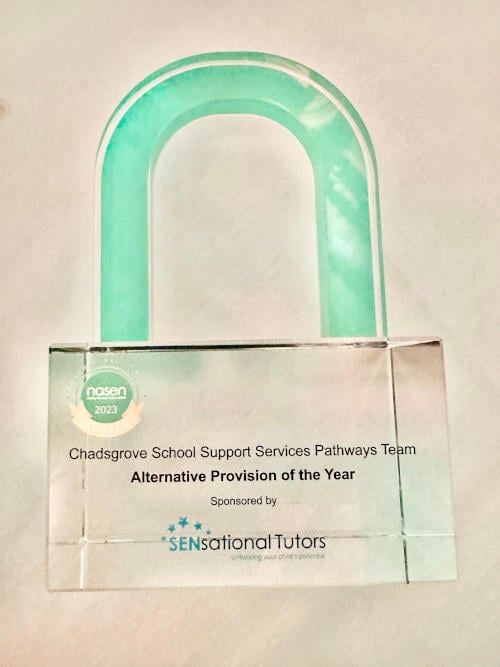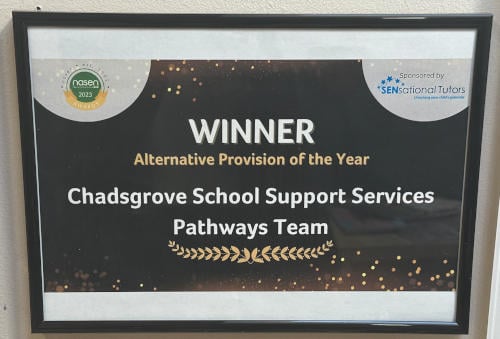There can be lots of reasons why a child refuses to go to school but whatever the causes, it can be tricky, stressful and time-consuming for parents and teachers trying to persuade them to change their mind. In some cases, despite everyone’s best efforts, a pupil never returns to any kind of educational setting.
‘Pathways’ – the alternative provision at Chadsgrove School in the West Midlands – takes an innovative approach to supporting young people back into education and so far has a 100% success rate.
In recognition of the work staff do, the centre recently won the ‘Alternative Provision of the Year’ award run by membership organisation NASEN – the National Association for Special Educational Needs. The award was sponsored by SENsational Tutors Ltd.
Joanna, director of SENsational Tutors, and Helen (specialist tutor at SENsational Tutors and former Headteacher) went to visit the provision to learn about the fantastic ways they support young people with SEND/special needs.
The Background of the Provision: School-Refusing is Often Connected to Neurodiversity

Mark Loveday, Head of Service and himself a specialist teacher, set up Pathways three years ago after realising there was a need for individualised support. The centre works with young people aged 7 – 16 who have emotionally-based school avoidance. “It’s usually due to a neurodiversity such as autism, dyspraxia or dyslexia,” he comments. “They need a very gentle, slow, bespoke approach.”
Pathways offers a step-by-step programme. Children who are referred to the service have often been out of school for at least two years, sometimes longer. To start with, a ‘link teacher’ will visit the child at home taking time to get to know them and their family and building a rapport. Once the child feels more confident, they may go out and about together – to the park or the library, for example – where the teacher will note the young person’s sensory responses to the environment.
Thorough Assessment Before Learning can Take Place
The next step is attending Pathways in person where they receive individual assessment of their cognitive abilities and support from a team which includes play therapists, occupational therapists, speech and language therapists. There is also help with behaviour and emotional regulation. Following that, the child will be gently reintroduced to formal learning.
The final stage, Mark explains, is easing the youngster back into an educational setting, preparing the child in stages and liaising with the receiving school. “Some kids return to their previous school. Others might go to a residential placement, a mainstream setting, college or an independent school.
Pinpointing the Obstacles is Key

“On average, it takes four terms to get them from the assessment stage to being back in an educational setting,” he elaborates. “The main difficulty is finding a place. We’ve had some amazing success stories. One young man who came to us had ASD and dyslexia and had been living in a tent in his bedroom. He wouldn’t even come out to use the toilet. We identified that his dyslexia was making him most anxious and when he received support with that, he was able to return to school.
“Another young lady had been out of school for six years and at first, would curl up in a ball. Now she’s going to start college to train to be a nurse.”
Helping Families of School Refusers

Mark acknowledges that families are often at breaking point by the time their child is taken on by Pathways. “It can be a lonely existence,” he says. “Because of this, we run regular groups for parents and grandparents with different discussion points and peer-to-peer support.”
Feedback has been very positive. One parent commented, ‘I wanted to take a moment to express my sincere appreciation and heartfelt thanks to each and every one of you. Our recent meeting left me feeling incredibly positive and emotional. Witnessing the remarkable progress we have made together is truly inspiring.’
Another remarked, ‘To all of you, I am genuinely grateful for your support and kindness. The progress we have achieved together is the power of teamwork. Thank you from the bottom of my heart.’
A Great Need for Specialist Help

Pathways is aiming to double the numbers of students they help by the end of the year. There is also a plan to offer more targeted help for looked-after students.
Helen comments that, “The success of Pathways is down to the passion of those who are driving it. Mark said that they ‘never say no’ and it doesn’t seem to matter how they get the young person on the right pathway, they are just all so determined to do it. Their work with parents and their involvement of other specialists is outstanding and the holistic approach to each child’s provision is inspiring.”




